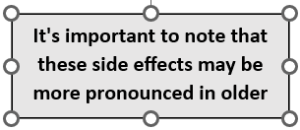For some time now the drug often used to control Attention Deficit Hyperactivity Disorder (ADHD) and narcolepsy has been found to have potential benefits for falls prevention in the elderly. Tragically, these falls result in emergency hospital admissions and accidental deaths. Anything that could help avoid these tragedies is worth pursuing. As such, Ritalin, also known as methylphenidate (MPH), has proven to prevent elderly falls.
Research Results for Ritalin
Researchers found that those who took Ritalin performed various tests more efficiently and exhibited less variability in their “stride time”. Furthermore, even a single dose of the drug has shown to improve balance control during walking thereby reducing the risk of falls among the elderly.
There seems to be a dual mechanism. Ritalin’s effects are thought to be multifaceted, involving both attentional improvements and direct influence on motor control areas of the brain.
Ritalin or Improved Cognition?
Researchers posit that the results may in part be due to the improved attention brought about by the medication. However, they also say that Ritalin actually has a direct effect since it acts on the motor and balance control portion of the brain. This is encouraging to our senior population for whom falls are the leading cause of injuries.
Prevent Senior Falls: Potential Benefits
- Improved Gait: Ritalin has been shown to enhance balance and walking stability in elderly individuals.
- Reduced Fall Risk: This improved gait can potentially lower the risk of falls, a significant concern for the elderly population.
- Reduced Hospitalizations: Fewer falls could lead to fewer emergency hospital admissions and a reduced burden on healthcare systems.
- Improved Quality of Life: Preventing falls can help maintain independence and improve the overall quality of life for elderly individuals.
- Reduced Mortality: Falls are a leading cause of accidental death among the elderly. Ritalin could potentially help reduce this risk.
While the research is promising, it’s important to note that further studies are needed to fully understand the long-term benefits and potential risks of using Ritalin for this purpose. Additionally, other factors such as lifestyle, environment, and overall health should also be considered in fall prevention strategies.
Side Effects of Ritalin in the Elderly
While Ritalin can be effective for ADHD and narcolepsy in younger individuals, its use in the elderly can present unique challenges. Some potential side effects include:
- Increased heart rate and blood pressure: This can be particularly concerning for individuals with existing cardiovascular conditions.
- Insomnia: Ritalin can make it difficult to fall asleep or stay asleep which is of great concern since older adults are at higher risk for both insomnia and the medical and psychiatric issues resulting from it.
- Loss of appetite: This can lead to weight loss and malnutrition which could have grave consequences for this demographic.
- Headache and irritability: These are common side effects that can affect daily functioning and heighten some of the impatience and agitation the elderly may already be experiencing.
- Metabolic Effects: Many drugs can have detrimental effects on the elderly due to slower metabolism.
- Increased Fall Risk: The lingering effects of these drugs can contribute to lightheadedness and increased risk of falls. Obviously, dizziness is the opposite of what we want when we look to prevent elderly falls.
- Polypharmacy: The overuse of multiple medications can lead to dangerous drug interactions and increase the risk of adverse events.
Drug Interactions with Ritalin
Ritalin can interact with a variety of other medications, particularly those that affect the nervous system or cardiovascular system. Some common drug interactions include:
- Antidepressants: Ritalin can increase the risk of serotonin syndrome, a potentially life-threatening condition.
- Blood thinners: Ritalin may increase the risk of bleeding.
- Stimulants: Combining Ritalin with other stimulants can increase the risk of side effects.
- Antihypertensive medications: Ritalin may reduce the effectiveness of blood pressure medications.
Long-Term Effects of Ritalin
While the long-term effects of Ritalin use in the elderly are not fully understood, there are some obvious concerns:
- Tolerance and dependence: Prolonged use of Ritalin can lead to tolerance, meaning that the medication becomes less effective over time.
- Dependence: Repeated use can lead to dependence making it difficult to stop using the medication.
- Unintended consequences: Long-term use of Ritalin may have unintended consequences that are not yet fully understood.
Importance of Regular Medication Review
While Ritalin shows promise in improving gait and reducing fall risk, it’s essential to consider the broader context of drug safety and interactions in the elderly population. By being aware of potential risks and taking proactive steps to manage medications, we can help ensure the well-being of older adults.
- Medication review: Regularly reviewing medications with a healthcare provider can help identify and address potential side effects and interactions that increase the risk of falls. Reviews can also help identify and address potential problems before they lead to serious consequences.
- Informed Decision-Making: Elderly individuals and their caregivers should be aware of all associated risks, side effects, and potential interactions.
Alternative Fall Prevention Strategies
There are many non-pharmacological interventions that can help prevent falls in the elderly, including:
- Physical therapy: Exercises to improve balance, strength, and coordination can reduce the risk of falls.
- Home safety modifications: Removing hazards from the home, such as loose rugs and clutter, can make it safer for older adults. Elderproofing an older adult’s home can make all the difference in terms of prevention and safety.
- Assistive devices: Canes, walkers, and wheelchairs can help older adults maintain balance and mobility.
- Vision and hearing care: Regular eye and ear exams can help identify and address sensory impairments that contribute to falls.
Resources for Elderly Care
- Merck Medication Guide: This online resource can provide valuable information about various medications.
- David York Home Healthcare Agency: This agency offers skilled home health aide services to support elderly individuals in their homes and stay informed about the latest guidelines.
Priority One: Prevent Elderly Falls
By considering these factors and exploring alternative approaches, healthcare providers and caregivers can make informed decisions about the use of Ritalin for fall prevention in the elderly.
David York Home Healthcare Agency provides skilled home health aide services for the elderly in their home and is abreast of all the latest guidelines for seniors.
David York Agency Homecare Helps Seniors
At David York Agency, we understand the many challenges and risks faced by the aging and elderly. We are dedicated to providing care to support them through all of those ups and downs. At David York Home Healthcare Agency, extraordinary service is what sets us apart from other companies that provide in home healthcare services.
DYA we could provide direction as to how to manage the total care of your senior loved one. Whatever your care needs, we are there for you, always striving to exceed your expectations. For more information about David York Agency’s qualified, compassionate caregivers, contact us at (718) 376-7755. A free phone consultation can help you determine what services would meet your needs. We would be happy to discuss your case with you.
We aim to provide you and your loved one with the assistance they need. If you’d like to hear more from us, please like us on Facebook or follow us on X or LinkedIn.
For more helpful tips and information, check out our blog or contact us today.







